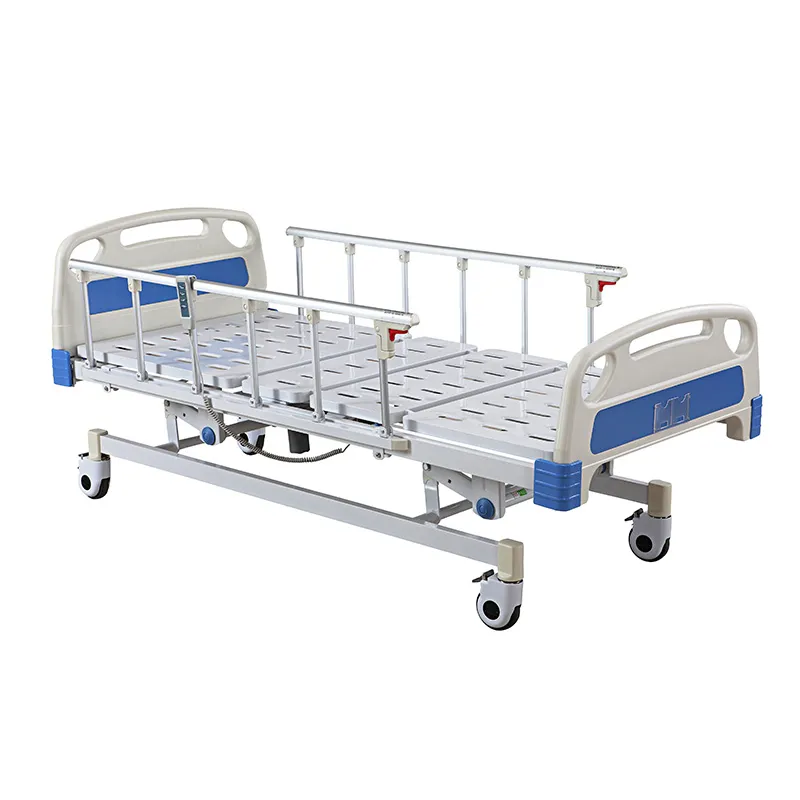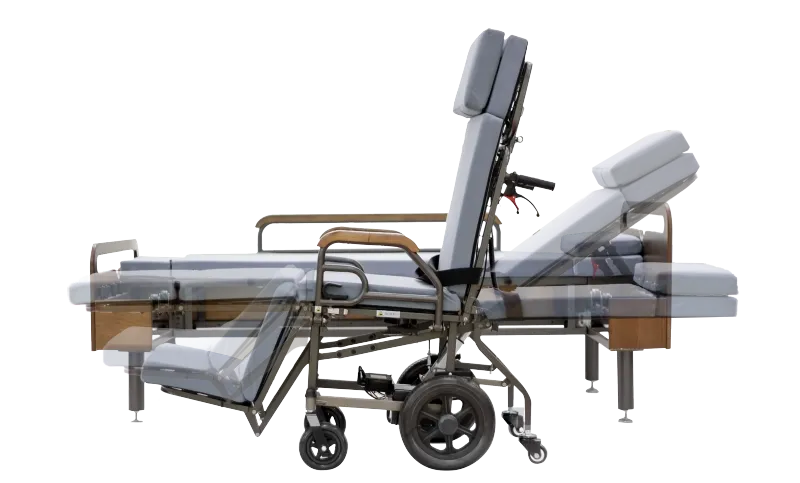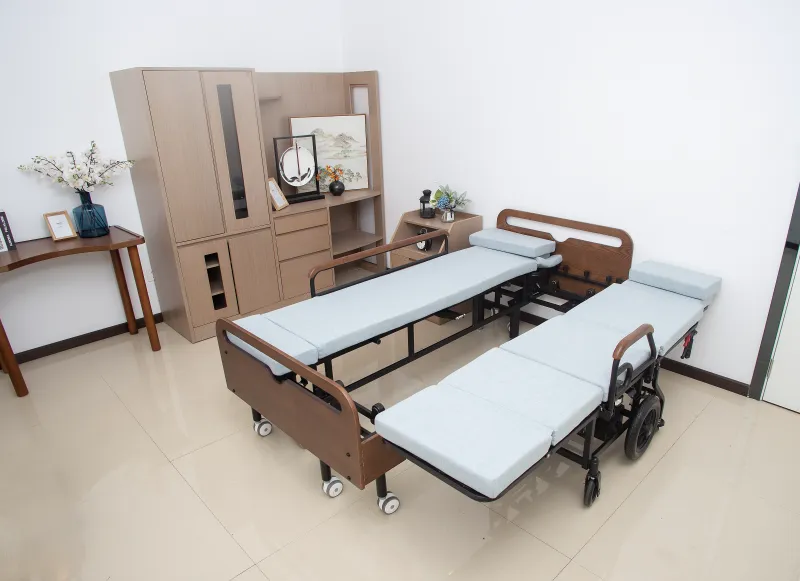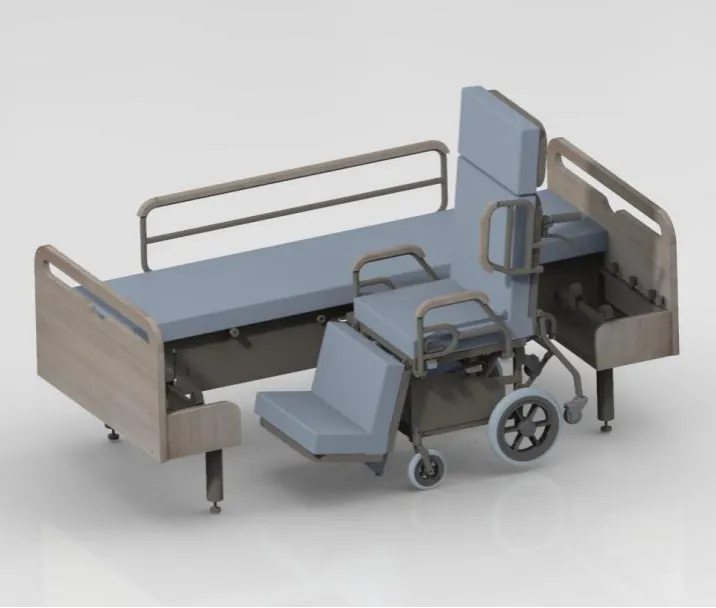
How Can a Hospital Bed Help Patients with GERD?
2024-09-16 15:30
In the dead of night, many people finally lie down and enjoy a much-needed rest for the day. However, for patients with gastroesophageal reflux disease (GERD), lying down to rest is not always a pleasant experience. The backflow of stomach acid can make their nights particularly miserable, and the right bed position and equipment can greatly improve this situation.
This article will explore the nature of GERD, why bed rest can worsen symptoms, and how hospital beds can bring comfort and relief to these patients.

What is GERD?
Gastroesophageal reflux disease, often shortened to GERD, is a common digestive system disorder characterized by the recurrent backflow of stomach acid or stomach contents into the esophagus. This backflow can cause irritation of the esophageal lining, causing symptoms such as burning, acidity rising up in the throat, and chest pain, which are usually most noticeable after meals or at night.
GERD is a chronic disease that, if not controlled, can lead to serious complications, including esophagitis, esophageal stricture, and even esophageal cancer. Despite the prevalence of GERD in the adult population, many people still fail to properly diagnose and treat the disease.
Why Does Bed Rest Seem to Make GERD Worse?
For many people with GERD, a night of rest can be a torture rather than a relief. When lying down, gravity no longer helps to keep stomach contents in the stomach, and stomach acid is more likely to flow back into the esophagus. Here are a few reasons why bed rest can make GERD symptoms worse:
Effect of Gravity
When standing or sitting, gravity naturally holds stomach contents in the stomach and prevents them from flowing back. However, when a person lies down, the effect of gravity disappears, and stomach acid is more likely to flow back into the esophagus. This is why many people with GERD have worse symptoms at night or when lying down.
Increased Gastric Acid Secretion
Gastric acid secretion usually peaks in the evening, which is one reason why GERD symptoms are more severe at night. Large amounts of stomach acid are produced during digestion, and if a person lies down immediately after a meal, this stomach acid can easily flow back into the esophagus.
Weakened Esophageal Sphincter
The lower esophageal sphincter (LES) is a key structure that controls whether stomach contents enter the esophagus. In some cases, the LES may become weaker or looser, especially at night or when you are relaxed. This makes it easier for stomach acid to flow back up, which can worsen GERD symptoms.
Effects of Food and Beverages
Some foods and beverages, such as coffee, chocolate, spicy foods, and alcohol, can stimulate stomach acid secretion or relax the LES, worsening GERD. GERD symptoms may be worse when patients lie down shortly after consuming these foods.

How Can Sleeping in a Hospital Bed Help Reduce GERD Symptoms?
Hospital beds are not just designed for hospitalized patients; many of the features they have can also come in handy in home care, especially for people with GERD. Here are a few ways hospital beds can help relieve GERD symptoms:
Adjust the height of the head of the bed
Hospital beds are often equipped with electric adjustments that make it easy to raise the head of the bed. This is particularly important because studies have shown that raising the head of the bed by 15 to 20 cm (6 to 8 inches) can significantly reduce the occurrence of acid reflux. In this way, gravity helps to keep the stomach contents in the stomach, reducing the chance of reflux.
Choice of side or back sleeping
Hospital beds allow patients to choose a sleeping position that works for them, especially when it comes to adjusting the inclination of the bed. Sleeping on the left side is said to reduce acid reflux because this position helps keep the stomach below the level of the esophagus. This position adjustment can be easily achieved with the adjustment function of the hospital bed, without the need for patients to position pillows or use additional equipment.
Reduce nighttime discomfort
People with GERD often wake up frequently due to aching or burning sensations during the night. Hospital beds can help patients find a comfortable position by adjusting the inclination and angle of the bed, thereby reducing discomfort and helping them get a better night's sleep.
Reduce the burden of getting up at night
For patients with severe GERD, frequent nighttime getting up can be a problem. The electric adjustment function of hospital beds can help patients change positions or sit up more easily without having to force themselves to get up, thereby reducing pressure on the stomach and avoiding aggravating symptoms.

Can Hospital Beds Help Relieve GERD Symptoms?
Hospital beds can indeed play an important role in relieving GERD symptoms. By providing a variety of adjustment functions, hospital beds can help patients find the sleeping position that suits them best, thereby reducing the occurrence of acid reflux.
Different patients have different symptoms, and hospital beds allow patients to adjust according to their needs. For example, some patients may need a higher head of the bed angle to prevent reflux, while others may need to sleep on their side to reduce discomfort. The flexibility of hospital beds allows them to meet various needs, providing patients with better comfort.
Compared with traditional bed or pillow stacking methods, hospital beds provide a more long-term and effective solution. The structural design and adjustment function of the bed can provide continuous support for GERD patients, helping them reduce symptoms at night, thereby improving their overall quality of life.
GERD patients often feel frustrated and exhausted due to nighttime symptoms. By improving sleep quality and reducing nighttime discomfort, hospital beds can help patients regain more energy and improve their daily quality of life.
What is the Treatment for GERD?
While hospital beds can provide some relief for GERD symptoms, treating GERD often requires a multifaceted effort. Many people with GERD can reduce their symptoms by making lifestyle changes. These adjustments include avoiding lying down immediately after eating, reducing the intake of high-fat foods, quitting smoking, limiting alcohol intake, and losing weight. These measures can reduce stomach acid production, improve the function of the LES, and reduce the occurrence of reflux.
Medication
For patients with severe symptoms, your doctor may recommend medication. Common medications include:
● Antacids: These medications neutralize stomach acid and quickly relieve the burning sensation caused by GERD.
● H2 blockers: These medications reduce stomach acid production and are often used to manage symptoms long-term.
● Proton pump inhibitors (PPIs): PPIs are the most commonly used medications to treat GERD and can significantly reduce stomach acid secretion, thereby reducing symptoms and complications.
In some cases, especially when medications are ineffective or the patient cannot rely on them long-term, surgery may be an option. The most common surgery is a laparoscopic fundoplication (Nissen fundoplication), which prevents acid reflux by strengthening the LES.
Other treatments
Some patients may also try alternative therapies such as acupuncture, herbal remedies, or dietary supplements. However, the effectiveness of these treatments varies from person to person and there is not enough scientific evidence to support them, so they should be used with caution.
Why Do Some Positions Help with GERD and Others Don't?
The effect of sleeping position on GERD is very important because it directly affects whether stomach acid tends to flow back into the esophagus. Here are some reasons why some positions help relieve GERD, while others are ineffective or even harmful:
Left Side vs. Right Side Sleeping
Research shows that sleeping on the left side can reduce acid reflux because this position keeps the stomach lower than the esophagus, which uses gravity to prevent stomach contents from flowing back up. In contrast, sleeping on the right side may worsen symptoms because this position places the stomach above the esophagus, increasing the risk of acid reflux.
Supine vs. prone
Sleeping on the back may make it easier for stomach acid to enter the esophagus, especially if the head of the bed is not elevated. In contrast, although the prone sleeping position can reduce reflux, it puts a greater burden on the respiratory tract and cervical spine and is not easy to maintain for a long time.
Elevating the head of the bed
As mentioned earlier, raising the head of the bed can use gravity to prevent acid reflux and is a simple and effective way to relieve GERD symptoms. It is generally recommended to raise the head of the bed by 15 to 20 cm for best results.

Extended Topic: Strategies for Coping with Gastroesophageal Reflux Disease at Night
In addition to adjusting sleeping positions and using hospital beds, patients can take other measures to reduce GERD symptoms at night:
● Eat dinner early: Avoid eating within 2-3 hours before going to bed to reduce the production of stomach acid at night.
● Choose the right pillow: Special anti-reflux pillows can help elevate the upper body to prevent acid reflux.
● Dietary control: Reduce the intake of foods that easily cause gastric acid secretion, such as coffee, chocolate, citrus fruits, etc.
Summary
GERD is a common but complex digestive system disease, especially at night, symptoms may seriously affect the patient's quality of life. The adjustable function of hospital beds provides an effective means of relief for patients. By changing the sleeping position, raising the head of the bed, etc., the symptoms can be significantly alleviated. Combined with lifestyle adjustments and necessary drug treatment, GERD patients can find a management method that suits them, so that they can get better rest at night and improve their overall quality of life.








